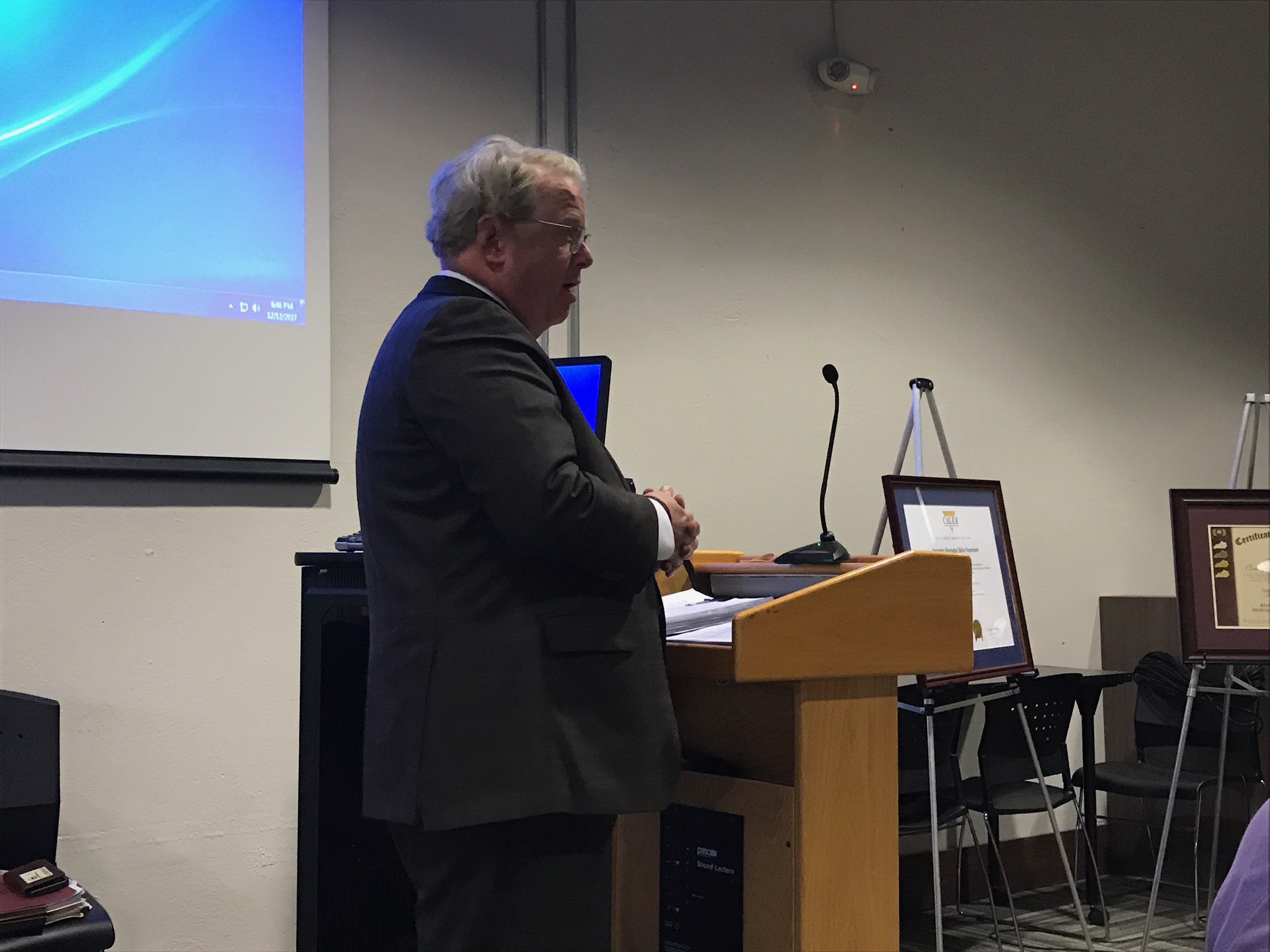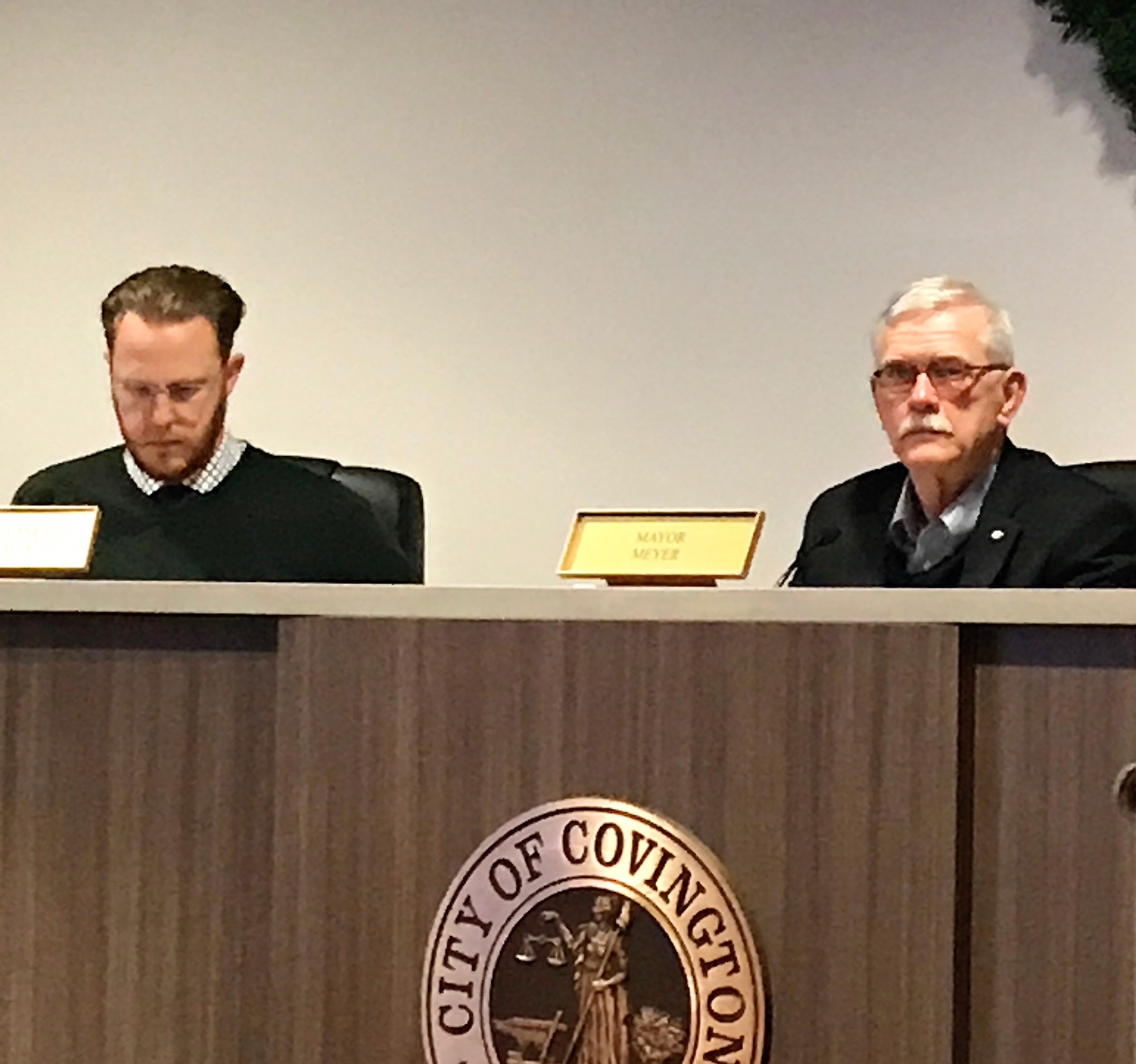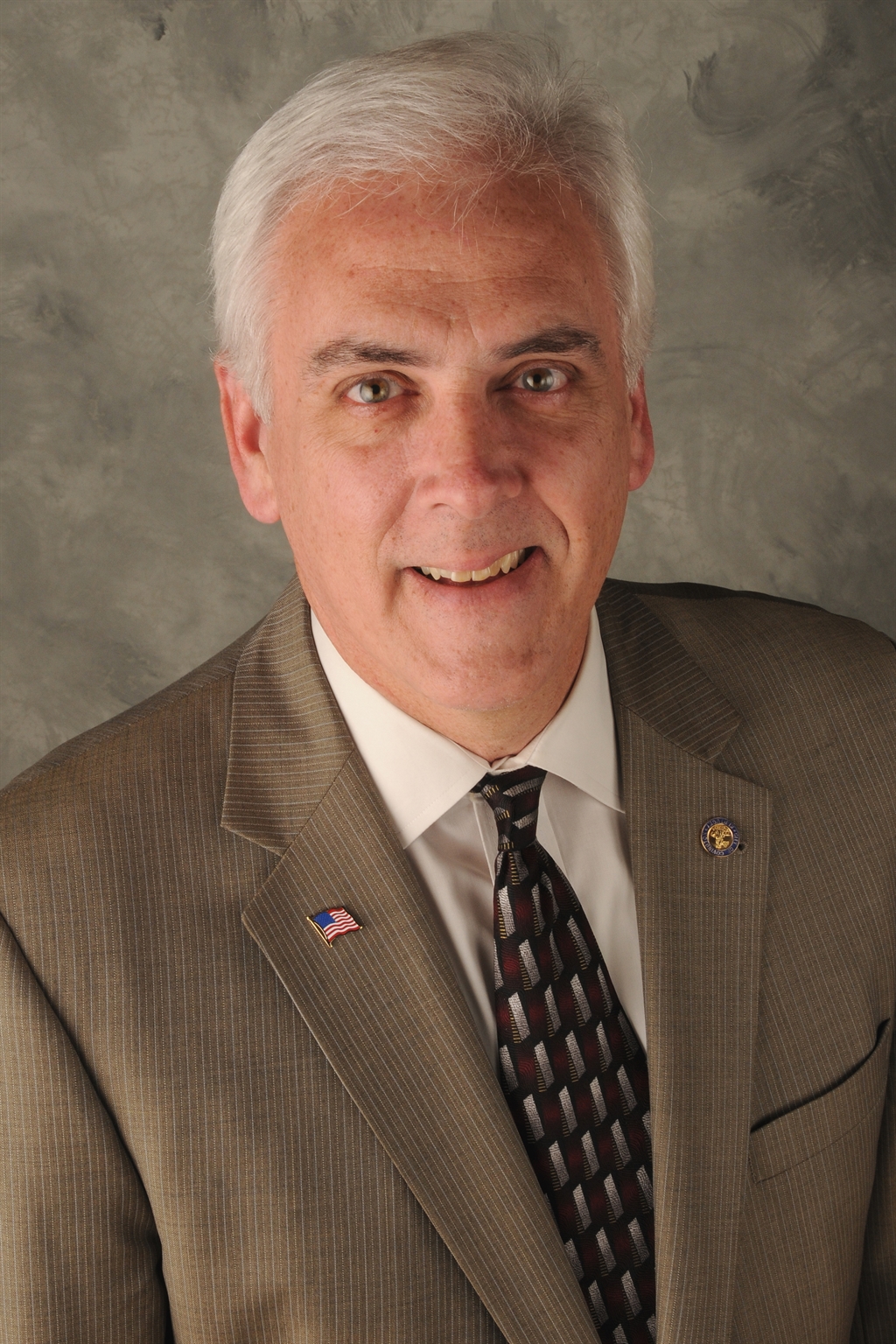By Mark Hansel
NKyTribune managing editor
An investigator hired by the Covington City Commission said there is strong evidence that former mayor Sherry Carran and then-city Manager Larry Klein violated state election laws during the 2016 mayoral campaign.

Lexington attorney Scott White provides details of his report to the Covington City Commission regarding question of misconduct in the 2016 General Election campaign (photos by Mark Hansel)
Scott White, a Lexington attorney with more than 30 years in practice and a former assistant deputy attorney general, said there is sufficient evidence of at least three violations, including one felony, by Carran and Klein.
White delivered a two-hour synopsis of a 30-page report detailing the investigation at Tuesday’s Covington City Commission meeting.
Carran was defeated by Mayor Joseph U. Meyer in November, 2016 and Klein resigned in February, after serving as city manager for eight years.
White said the evidence uncovered in his investigation indicates Carran and Klein copied emails, then had them removed from their City accounts before they left office.
White said the emails are public record and KRS 519.060 (1) (b) provides that a person who “intentionally destroys, mutilates conceals, removes or otherwise impairs the availability of any public records,” without the ability to do so, is guilty of tampering with public records.
Violation of the statute is a Class D felony, which is punishable by not less than one year, nor more than five years in jail, according to the Kentucky Legislative Research Commission.
White reached the conclusion regarding the emails based on information provided by C-Forward Information Technologies, the Covington firm that manages the City email accounts.

The setting may appear festive, but the Covington City Commission found little holiday cheer in the report from Lexington attorney Scott White. In addition to allegations of campaign finance violations, White determined former Mayor Sherry Carran and former City Manager Larry Klein may be guilty of tampering with public records, a felony offense, by removing emails.
A C-Forward investigator determined that “based on what I am seeing, I believe that Klein and Carran archived their emails from the missing time period and took them with them when they left.”
The emails are believed to cover the time period from March or April of 2016, to December 31 of that year, her last day in office.
Two misdemeanor allegations, which cannot be prosecuted because a one-year statute of limitations has expired, stem from complaints filed by the International Association of Firefighters (IAFF) Local 38
IAFF Local 38, the Covington Fire Department union, filed the complaint just prior to the 2016 General Election. It indicates Klein violated election laws by providing information to Carran and incumbent city commissioners Bill Wells and Jordan Huizenga in advance of a candidate forum.
The Kentucky Office of the Attorney General (OAG) and the Kentucky Registry of Election Finance (KREF) investigated those allegations against Klein last year and determined he had not violated election laws.
White was extremely critical of the OAG’s office and the KREF, saying “neither engaged in a competent investigation of the allegations reported separately to them.
“I was able to conclude fairly quickly that the Office of the Attorney General had not interviewed any of the witnesses who had any of the information, had not reviewed or had access to any of the email accounts, had not consulted with Commonwealth’s Attorney Rob Sanders about using the then-existing grand jury to obtain witness testimony or issue subpoenas,” White said. “Yet, they had rendered an opinion that there had been no wrongdoing by Klein.”
IAFF Local 38 filed the complaint with Sanders, who turned it over to the OAG to avoid a potential conflict of interest, since he had expressed support for Meyer prior to the election.
White said it is important to note that only Carran requested the information. Wells and Huizenga did not, and received it because they were the only incumbents seeking reelection. He said neither acted inappropriately and commended Wells for sharing the information with another candidate.
According to White’s report, there are two discrete pieces involving IAFF Local 38 that are relevant to the investigation.
Fire and public safety were major issues in the 2016 General Election for both mayor and City commission and IAFF Local 38 conducted a candidate forum on September 8, 2016, inviting all candidates to attend.
The invitation indicated that endorsements by IAFF Local 38 would be based on candidate presentations.
On Sept. 1, at Carran’s urging, Klein emailed Fire Chief Dan Mathew, City Solicitor Frank Warnock and then-Finance Director Lisa Desmarais, instructing them to help develop a quick synopsis on information that would be used to prepare for the forum.
Klein indicated the information should be shared with the mayor and commission and any candidate for office who requests it.
Klein followed up with a September 4 email to Desmarais, copying Carran, requesting an update on the status of obtaining information on response times of ambulances and first responders.
The information was not specifically listed by IAFF Local 38 for inclusion in the forum. Desmarais indicated the information would not be available until September 9, the day after the forum.
According to the report, Carran responded to the email, stating, “Friday works a far as getting information to the voters when we go door-to-door. We have our candidate forum with Local 38 Thursday (September 8) but they’re not going to be happy with the answers we give them.”
White said this demonstrates Klein and Desmarais knew the information was being assembled not for the forum, but for campaigning.
At a September 6 meeting, Warnock expressed concerns that the political process was intruding into the work of City employees, a position shared by Mathew.
On September 7, according to the report, Warnock emailed Klein again indicating concerns that he and Desmarais should not be involved in providing information to incumbent candidates to be used in a campaign event.
The discussion included only Klein and Warnock and is based on an interview with Warnock. White has not interviewed Klein, Carran or Desmarais.
Warnock again indicated that he thought it was poor judgment, but was assured by Klein that the information would be available to all candidates.
An email was then sent to the incumbents running for reelection and while Warnock and Mathew indicated in interviews that they still had concerns, they felt there was nothing more they could do at that point.
While White acknowledged that Warnock and Mathew could have sent the email to the other candidates, he said they had already expressed their concerns appropriately.
He said, in his opinion, no other city employees had acted inappropriately and praised Warnock for his determination in expressing his concerns to Klein on more than one occasion.
While Klein indicated he would provide the information to other candidates, then-candidate Tim Downing requested information on the need for South Covington, Company 5, to have an ambulance, on three occasions. The information was included on the IAFF Local 38 topic list, but was not provided to Downing, now a city commissioner, until after the election.
Mathew shared the information regarding the assembly and dissemination of information for incumbent candidates with officials from IAFF Local 38.
IAFF Local 38 subsequently requested emails from the City to verify the information, but the voluminous information requested made accommodating it impossible for the City to comply in a timely manner.
The City ultimately produced some of the emails in batches, prompting IAFF Local 38 to file its complaint with the Commonwealth Attorney’s office.
White determined that there is sufficient evidence to initiate and pursue an investigation into whether Klein and Carran had violated the Kentucky penal code in using city resources to assist the Carran for Mayor Campaign.
He also stated that there is significant evidence indicating Carran and Klein violated campaign finance laws by contributing and accepting illegal in-kind contributions from Klein in excess of $2,000 that were not reported to the KREF.

Covington Mayor Joseph Meyer, right and City Commissioner Jordan Huizenga listen to the report from Lexington attorney Scott White.
The determination is based on the belief that the City staff and resources were used, at taxpayer expense, to assemble and disseminate information for use in Carran’s reelection campaign.
Klein had indicated on more than one occasion that he believed if Meyer was elected he would be fired, which White suggested could have motivated him to support Carran’s campaign effort. White provided a list of 10 instances where Klein’s behavior indicated that support.
Neither Klein, nor Carran, can now be prosecuted for the alleged misdemeanor violations, but the City could ask for investigation to get a clarification on the propriety of their conduct.
The alleged removal of emails, however are a different matter.
If there is evidence of a possible felony for which there is no statute of limitations, the City Commission could ask Sanders to conduct an investigation to determine if charges should be brought.
In that case, Sanders could again ask for the OAG to take over the investigation due to a possible conflict of interest. White, however, said that since the election is over, he believes the conflict no longer exists.
Meyer encouraged the other members of the City Commission to read the reports and ponder over them. He said one thing it indicates clearly to him is that there is no doubt that there were public resources used for political reasons, for campaign reasons.
“Under law, the use of public resources for political campaigns is fundamentally wrong, it’s illegal,” Meyer said. “When we are having our public employees engage in illegal campaign conduct, it does substantial damage to, not just our officials and not just our process, but to the employee themselves. Plus, it erodes the public trust in government and it damages the reputation of our city and its government. With our history of the past several years, it’s fragile.”
Regarding the destruction of emails, Meyer said it is troubling, not just on its face, but because it speaks to a cultural issue where some former City leaders believed the rules didn’t apply to them.
“In 2014, the Attorney General issued an open records decision and said to Covington, “You’re not allowed to get rid of your emails. You’ve got to hold on to them for two years.’ So if there was in fact a removal of significant numbers of emails from our server, it had to have been done knowingly and in violation of the law.”
Meyer said the City Commission will review the report in its entirety, including a list of recommended changes the City might implement to prevent a recurrence of the alleged violations, and decide how to proceed.
Contact Mark Hansel at mark.hansel@nkytrib.com



















It would be nice to see the Mayor look forward instead of backward.
Why are the emails not being backed up? If anything, C Forward should be held liable! Archiving emails should not delete them off central servers! These two did not hack in and delete documents. They probably didn’t even realize that archiving email in poorly set up systems can remove that data from the mail server! This lawyer seems to have an agenda and jumps to conclusions too quickly. We need the facts first. He luckily is not the final judge but I wonder how many details he skips over in his pursuit to find evidences to prove a point. I hope the city can put better policies in place going forward and use truly independent investigators. In other news, what is the city doing other than filing internal investigations? The only other projects I see going on were in place before the new admin.
What a curious comment. The story doesn’t say anything about the “archiving” of emails being deleted from the server, nor does it say anything about the “archiving” causing the emails to be removed from the server.
The story simply says they “archived the emails and took them with them when they left.”
Where are you getting all this other information? So weird.